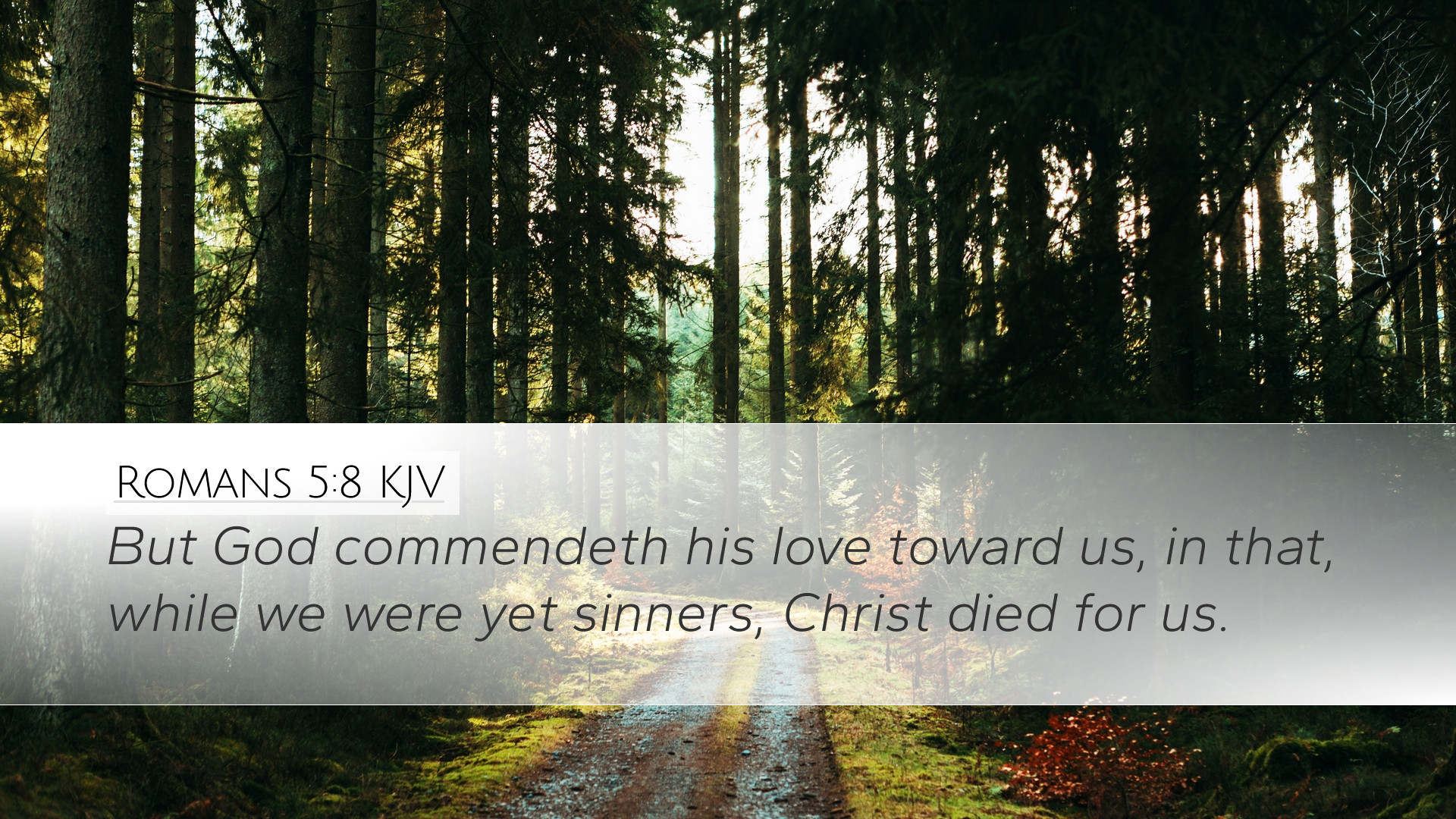Old Testament
Genesis Exodus Leviticus Numbers Deuteronomy Joshua Judges Ruth 1 Samuel 2 Samuel 1 Kings 2 Kings 1 Chronicles 2 Chronicles Ezra Nehemiah Esther Job Psalms Proverbs Ecclesiastes Song of Solomon Isaiah Jeremiah Lamentations Ezekiel Daniel Hosea Joel Amos Obadiah Jonah Micah Nahum Habakkuk Zephaniah Haggai Zechariah MalachiRomans 5:8
Romans 5:8 KJV
But God commendeth his love toward us, in that, while we were yet sinners, Christ died for us.
Romans 5:8 Bible Commentary
Commentary on Romans 5:8
Romans 5:8 (ESV): "But God shows his love for us in that while we were still sinners, Christ died for us."
Introduction
This verse encapsulates the profound love of God demonstrated through the sacrificial death of Jesus Christ. Each public domain commentary offers unique insights that help illuminate the depth and significance of this passage. By combining the thoughts of Matthew Henry, Albert Barnes, and Adam Clarke, we can gain a richer understanding of the theological implications and pastoral applications of Romans 5:8.
The Nature of God's Love
Matthew Henry emphasizes that the love of God is not a passive feeling but a deliberate action. God's love is showcased through Christ's death for humanity while they were still in sin—highlighting a grace that precedes and prompts any response from us.
- Unconditional Love: This verse illustrates that God’s love is not based on our merit. Even in our sinful state, God made the first move towards us.
- Demonstrative Action: The phrase "shows his love" indicates that love is most vividly expressed through action rather than mere words. The act of Christ’s sacrifice is the ultimate demonstration of divine love.
Theological Significance
Albert Barnes reflects on the theological ramifications of Christ dying for sinners. This verse challenges the notion of human worthiness and presents a God who seeks to redeem rather than condemn.
- Doctrine of Atonement: The atonement is central to Christian doctrine and underscores the notion of substitutionary sacrifice. Christ’s death serves as the redemptive work that reconciles mankind to God.
- The Human Condition: The term "sinners" is significant—it speaks to the universal human condition. There are no exceptions; every person is in need of salvation, emphasizing the inclusive nature of God’s redemptive plan.
Christ's Death: An Act of Grace
Adam Clarke notes the immense grace embodied in Christ's death. The timing of this sacrifice reveals God's sovereign choice to act in love regardless of human response.
- Grace Extended: The verse makes it clear that grace is extended to all, not based on prior righteousness but on God's willingness to forgive and save.
- Incomprehensible Love: The idea that Christ died for us "while we were still sinners" speaks to the monumental depth of God's love and grace. It contradicts human logic, which often ties love to merit.
Pastoral Implications
This verse offers essential insights for pastoral care. It encourages pastors to communicate the message of grace vigorously and remind congregants of the depths of God’s love.
- Encouragement for the Weary: Believers struggling with guilt or shame can find immense comfort in this truth. God's love does not depend on their performance.
- Call to Evangelism: Understanding that Christ died for all encourages a mission-minded approach, calling Christians to reach out to those who believe they are beyond redemption.
Conclusion
Romans 5:8 serves as a cornerstone for understanding the nature of God's love and grace. It invites profound reflection on the sacrifice of Christ and its implications for humanity. By integrating the insights from Henry, Barnes, and Clarke, we appreciate the richness this verse offers to believers—inviting them into a deeper relationship with God rooted in love, grace, and the assurance of salvation.


